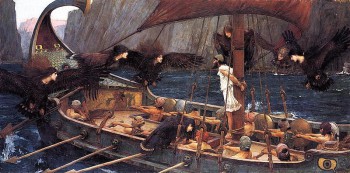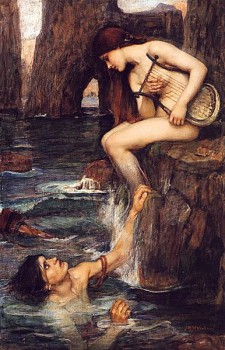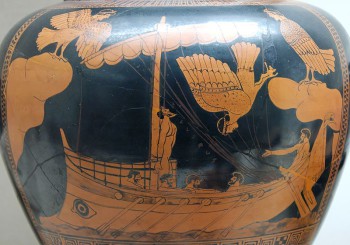Ancient Worlds: I Have Heard the Sirens Singing Each to Each…

“No, sir, it’s too perilous!”
So Odysseus is still trying to find his way home, and if it feels like we’ve been talking about this trip forever, imagine how he felt.
In order to get home, Circe tells Odysseus he will have to sail past the Sirens. Homer tells us these are beautiful sea goddesses who lure men to shipwreck on the rocks around their island. How? With their singing.
In order to make certain this doesn’t happen to his own men, Odysseus orders them to stuff their ears with wax so that they can’t hear the Sirens’ song. But he is unable to pass up the opportunity to hear them himself. Instead, he leaves his ears open but has his men lash him to the mast so that he cannot redirect the ship or jump overboard.
Modern interpretations of the Sirens have taken several different angles to explain their power, usually with two variations. Either their voices themselves have magic powers that lure people in, or the seduction is taken far more literally.

In Homer, however, it was their words that lured Odysseus in. They promised to sing him of great deeds. But not just any great deeds: his own. In short, they appeal to his vanity, his love of his own legend. Which, considering their target, is highly appropriate.
To the Homeric Greeks, a man’s legend was all he had. Life was short, we’ve already learned that the afterlife is terrible, and material prizes rust and rot. But a man’s fame can last… well, clearly, for at least three thousand years.
Or, to quote the great Keanu Reeves, “Bruises fade, chicks dig scars, glory lasts forever.”
But of course, the promise of that glory comes with destruction. It’s a theme Homer hits again and again: glory is eternal, and is what these men all prize. But is it worth it? Achilles has already told Odysseus that it isn’t, but Odysseus doesn’t seem to be listening.
As a (would-be) writer, I think there’s something of the metapoetic here. Metapoetic is one of those trendy words to break out at your next cocktail party that basically means “self-consciously writing about writing in your writing”. In the act of creation, in the journey of art, it’s impossible not to think about your audience. And to the extent that art is about communication, you should consider the audience. But becoming too concerned with what people will think, too preoccupied with “the market” or chasing trends is deadly to art. It will become shipwrecked on the rocks of commercialism, inspiration will get tangled in insecurity, and what you create becomes more about ego than about art.
Or maybe it’s just about ladies on rocks looking hot to men lost at sea.
On another front, the Sirens haven’t just given us an entire class of seductive lady-monsters. They’ve also contributed to legal terminology. It’s from this story that we get the term “Ulysses Pact”, which is a kind of contract that you establish when in one state of mind that will bind you when you are in another. Formally, these may be things like living wills or care instructions for people with recurring mental or emotional problems. Informally, if you give your phone to your best friend and say, “No matter what, no matter how hard I beg, do not let me call anyone after the third shot of tequila”, you’ve made use of a Ulysses pact.
